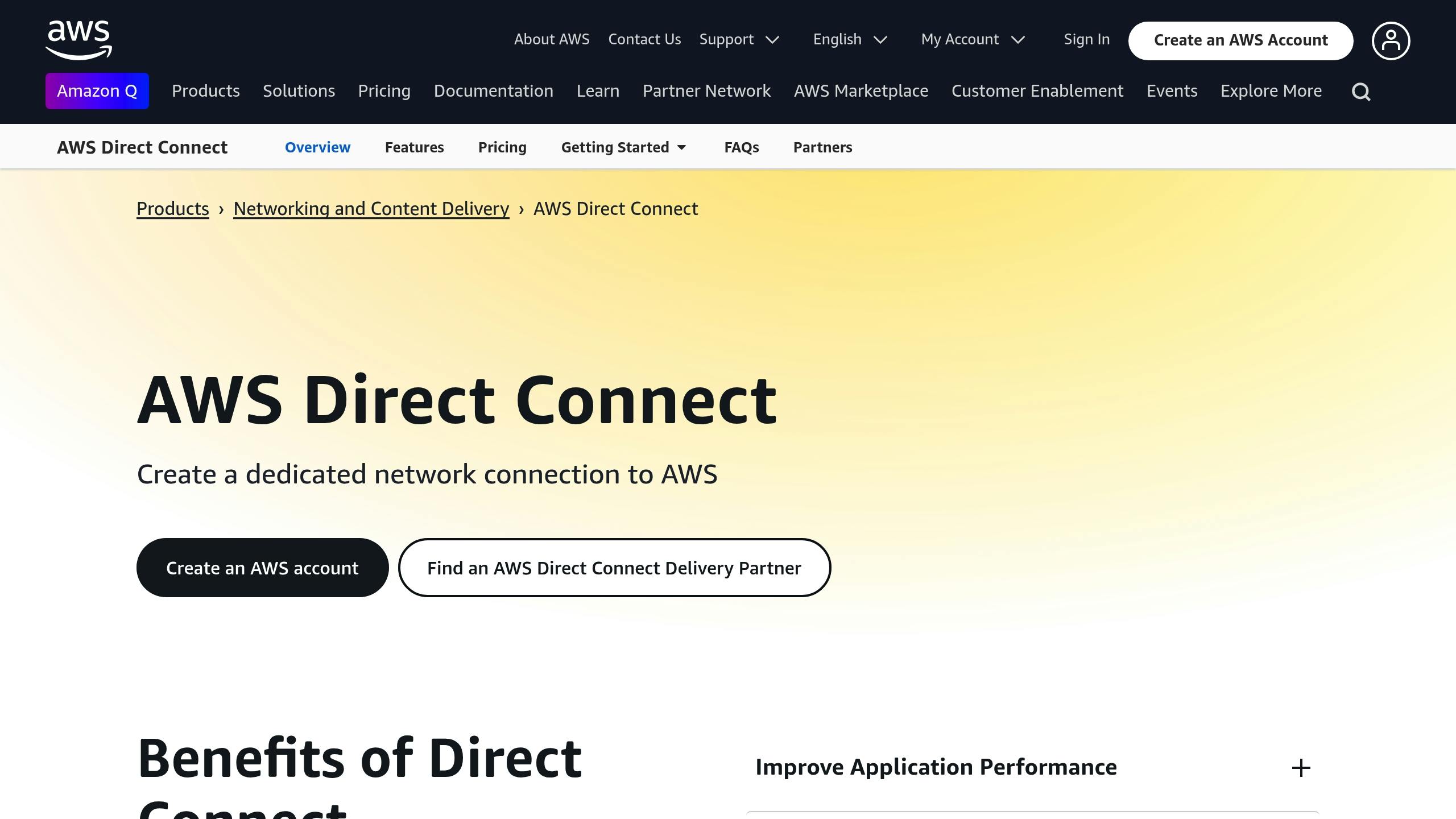AWS Direct Connect and AWS VPN are two ways to connect your on-premises network to AWS cloud resources. Here’s a quick breakdown of their key differences:
- AWS Direct Connect: Provides a dedicated, private connection to AWS with consistent performance, low latency, and high bandwidth (up to 100 Gbps). It’s ideal for large data transfers, real-time applications, and industries with strict compliance needs. However, it has higher setup costs and takes weeks to deploy.
- AWS VPN: Uses encrypted tunnels over the public Internet, offering lower costs and quick setup (within minutes). It’s best for smaller workloads, remote access, and backup connections but has variable performance and lower bandwidth (up to 1.25 Gbps per tunnel).
Quick Comparison
| Feature | AWS Direct Connect | AWS VPN |
|---|---|---|
| Setup Time | 4–12 weeks | Minutes |
| Bandwidth | Up to 100 Gbps | Up to 1.25 Gbps/tunnel |
| Cost | High (infrastructure) | $37.20/month+ |
| Performance | Consistent, low latency | Variable |
| Security | Private, optional MACsec | Built-in IPSec |
TL;DR: Choose Direct Connect for high-performance, large-scale workloads. Opt for VPN if you need a fast, budget-friendly solution. For maximum security and reliability, combine both.
Direct Connect vs VPN: Main Differences
Network Performance
AWS Direct Connect relies on dedicated physical connections, offering consistent and low-latency performance. With bandwidth options ranging from 50 Mbps to 100 Gbps, it ensures reliable connectivity. On the other hand, AWS VPN operates over the public internet, providing a maximum bandwidth of 1.25 Gbps per tunnel. While this can meet the needs of many applications, its performance depends on internet routing and traffic conditions.
Pricing Structure
AWS Direct Connect comes with notable upfront infrastructure costs. In contrast, AWS VPN offers a simpler pricing model at $37.20 per month per connection. This price includes hourly connection charges and data transfer fees, with no initial setup costs.
Security Options
AWS VPN includes built-in IPSec encryption by default, securing data as it travels over the public internet. AWS Direct Connect, however, does not provide encryption by default. It does support optional MACsec encryption for dedicated connections. For encrypted traffic, users can implement a private IP VPN over Direct Connect.
These differences in performance, cost, and security play a key role in determining the best fit for specific use cases, which will be discussed in the upcoming sections.
Best Use Cases
Direct Connect Use Cases
AWS Direct Connect is ideal for situations where consistent network performance and high bandwidth are critical. For example, financial institutions rely on it for high-frequency trading, where ultra-low latency is a must. Similarly, healthcare organizations use it to securely transfer large medical imaging files.
Here are some common scenarios where Direct Connect stands out:
- Large-scale data migrations: When moving petabytes of data to AWS, Direct Connect ensures steady transfer speeds without the delays caused by internet traffic.
- Real-time data processing: Applications like financial trading systems or real-time analytics benefit from its reliable, low-latency performance.
- Regulatory compliance: Industries with strict data security requirements can use the private, dedicated connection to avoid the public internet.
However, if you need flexibility or a quick setup, AWS VPN might be a better fit.
VPN Use Cases
VPN connectivity is well-suited for businesses that prioritize fast deployment and lower costs. For instance, a software development company could use VPN to provide secure remote access to AWS for testing and development.
VPN works best for:
- Development and testing: Teams with occasional AWS access needs can establish secure connections quickly.
- Disaster recovery: Organizations can maintain backup connectivity that activates only during outages.
- Remote workforce access: Distributed teams can securely connect to AWS without the need for dedicated infrastructure.
Choosing between these services depends on your technical requirements and business priorities. For instance, a media company processing 4K video content would benefit from Direct Connect's high bandwidth, while a web development agency working with smaller clients might prefer VPN for its flexibility and lower cost.
| Requirement | Recommended Service | Key Benefit |
|---|---|---|
| High-frequency trading | Direct Connect | Consistent sub-millisecond latency |
| Remote developer access | VPN | Quick setup, low cost |
| Large dataset processing | Direct Connect | Up to 100 Gbps bandwidth |
| Backup connectivity | VPN | Easy activation when needed |
| Healthcare imaging | Direct Connect | Private, compliant data transfer |
sbb-itb-6210c22
Using Direct Connect with VPN
Pairing AWS Direct Connect with VPN creates a powerful hybrid solution that combines consistent, high-speed connectivity with end-to-end encryption. This setup involves deploying a private IP VPN over a Direct Connect transit virtual interface (VIF), offering better throughput, more route capacity, and reduced reliance on public IPs. Here’s a breakdown of the key benefits and considerations:
| Aspect | Benefit | Technical Details |
|---|---|---|
| Performance | Higher throughput | Supports up to 100 Gbps bandwidth with Direct Connect while retaining VPN security |
| Route Capacity | Increased route limits | Handles 5000 outbound and 1000 inbound routes |
| Security | Better protection | Ensures end-to-end encryption, eliminating exposure to public IPs |
| Management | Streamlined operations | Reduces dependency on third-party VPN infrastructure |
This setup is particularly useful for industries like healthcare and finance, where strict regulations demand secure and private connections. By using a private IP VPN, organizations can avoid public IP exposure, shrinking their attack surface while still taking advantage of Direct Connect’s high bandwidth.
Setup and Costs
While Direct Connect offers unmatched performance, it requires more time to establish - typically 4 to 12 weeks - compared to the few hours needed for VPN setup. Additionally, the hybrid approach is more expensive. VPN alone costs roughly $37.20/month, but Direct Connect involves significant infrastructure investments. However, the trade-off is improved security and performance.
Key Technical Tips
- Set up a private IP VPN over Direct Connect transit VIFs.
- Use redundant connections to ensure high availability.
- Monitor bandwidth usage to take full advantage of the 100 Gbps capacity.
- Optimize route management to handle the expanded limits effectively.
This combination of Direct Connect and VPN strikes a balance between performance and security, making it an ideal choice for organizations with demanding connectivity requirements.
Summary
Key Points
When deciding between AWS Direct Connect and AWS VPN, the choice often hinges on performance needs and budget. Direct Connect is ideal for industries like healthcare and finance that demand stable, high-speed connections, offering bandwidths from 50 Mbps to 100 Gbps.
| Aspect | AWS Direct Connect | AWS VPN |
|---|---|---|
| Performance | Up to 100 Gbps, low latency | Up to 1.25 Gbps per tunnel |
| Setup Time | 4–12 weeks | Minutes |
| Base Cost | Thousands of dollars | $37.20/month |
| Security | Private connection, optional MACsec | IPSec encryption |
For quick and budget-friendly solutions, VPN works well, especially for smaller-scale needs. On the other hand, Direct Connect provides unmatched reliability and speed, making it a go-to for handling sensitive data or large-scale workloads, despite its higher cost and longer setup process.
Learn More
Your decision will largely depend on how critical performance is for your use case and what your budget allows. For step-by-step guides on implementing AWS connectivity solutions like Direct Connect and VPN, check out AWS for Engineers. This resource is packed with technical insights tailored for software engineers, including configuration tips and best practices for AWS services.
FAQs
What is the difference between AWS Direct Connect and VPN?

AWS Direct Connect relies on a dedicated physical connection, while AWS VPN uses an encrypted tunnel over the public internet.
| Aspect | AWS Direct Connect | AWS VPN |
|---|---|---|
| Connection Type | Dedicated physical line | Virtual tunnel over internet |
| Bandwidth | 50 Mbps - 100 Gbps | Up to 1.25 Gbps per tunnel |
| Setup Time | 4-12 weeks | Minutes |
| Default Security | No built-in encryption | IPSec encryption |
| Network Stability | Consistent performance | Variable performance |
| Cost Structure | Port hours + data transfer | Connection hours + data transfer |
Here’s a closer look at each option:
AWS Direct Connect offers a private connection that bypasses the public internet, ensuring more stable and predictable performance. While it doesn’t include encryption by default, you can enable MACsec encryption for added security.
On the other hand, AWS VPN secures data by encrypting all traffic using IPSec protocols. It operates over the public internet, making it quicker to set up but subject to variable network performance.
For businesses needing both reliability and security, combining Direct Connect with VPN can deliver the best of both worlds - dedicated performance and encrypted communication.


